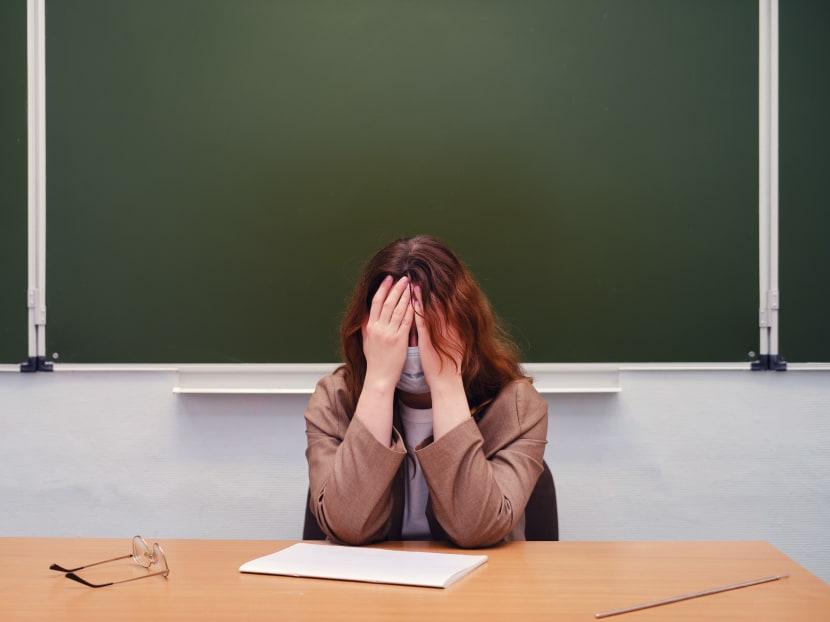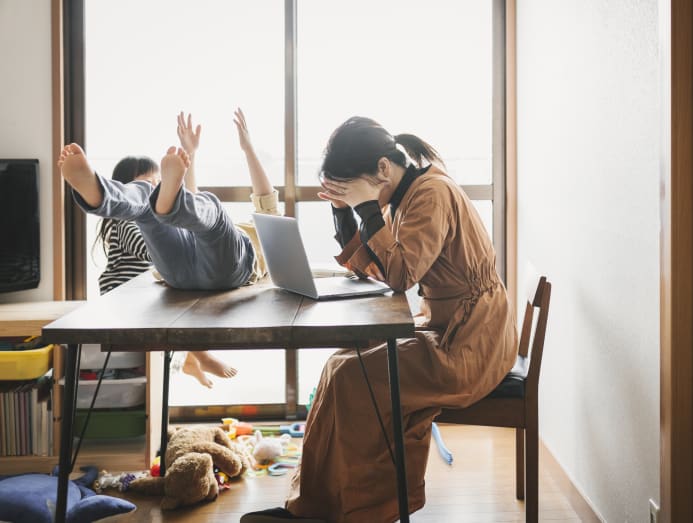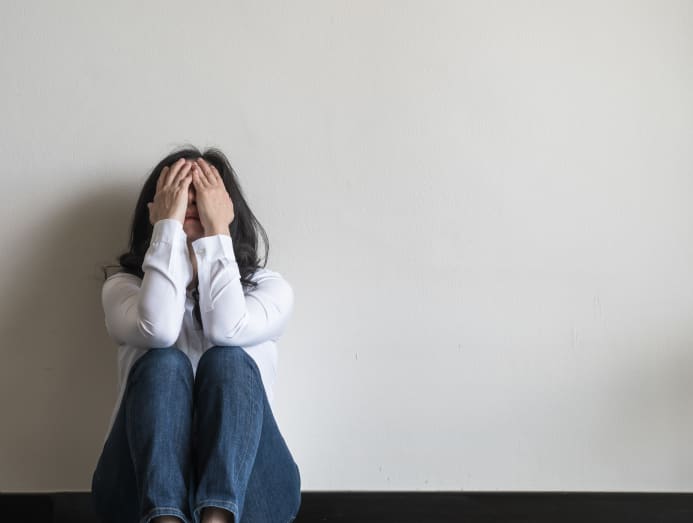‘My mental health is at an all-time low’: Teachers talk of burnout, MOE aware that ‘gaps’ need plugging
Advertisement
CNA Insider
'My mental wellness is at an all-time low': Teachers talk of burnout, MOE aware that 'gaps' need plugging
As they struggle with a heavier workload due to the pandemic, teachers open up about inadequate support from school leadership and why their mental health seems an 'reconsideration'.

Some teachers are struggling to seek help for their mental health. (File photograph: iStock)
- Abode-based learning, safe management measures and uncertainty of appraisal procedure have meant some teachers are taking on more than piece of work than they can acquit.
- Students made more than "highly strung" by COVID-nineteen restrictions are affecting teachers too.
- MOE says appointment survey shows that 70 per cent of teachers "can cope" with work stress, but "acknowledges" struggles of the rest.
- Teachers share their problems seeking aid from school leadership, amid prevailing stigma attached to mental wellness bug.
* Denotes name changed to protect the person's identity.
SINGAPORE: As Betty* lay curled into a ball on the floor — in tears, hyperventilating, center beating quickly — the secondary school teacher hoped the panic set on would fade shortly. Because she knew she could not afford to spend time away from piece of work.
"I have to become over it, I take to go and marking (papers) and do my piece of work," she idea.
Her panic attacks typically happen once a fortnight. A heavy workload, dealing with parents' expectations and large form sizes are perennial stressors, for her and some other teachers.
It was worse for Betty when Singapore moved to full abode-based learning in Apr last twelvemonth amid concerns over escalating COVID-19 infections. The frequency of her panic attacks increased to twice a week.
"Nosotros suddenly had to pin to online learning … in a very short couple of days, push button out and create resources from scratch, record ourselves doing online lectures, design online quizzes," she said.
"That was extremely stressful. We still needed to give feedback to our students and go along giving them piece of work and proceed preparing more resource. It was similar the work never stops. I was really, really burnt out — very, very depleted."
Apart from the workload, some teachers feel that their mental health has been overlooked or not prioritised.
After the River Valley High School (RVHS) incident took identify, Susan*, who is from another school, was on the warning for students on "suicide lookout". But likewise running through her listen was whether she could finally raise the issue of teachers' mental health.
So when she was giving her chief a routine update on her at-chance students, she decided to "boldly ask" about that.
"I was rather saddened to hear her say, 'the mental wellness of teachers? Information technology depends on all of you. You lot guys are adults. Yous need to take care of each other and lookout out for one another,'" she recounted.
While information technology sounded "noble", it felt "quite invalidating", Susan said. "It's a failure to recognise that you demand to take care of the caregiver."
Betty and Susan are among the 100-plus teachers who responded to CNA Insider's telephone call on Instagram for teachers to share how they were coping mentally.
Follow CNA Insider on Instagram here
One instructor wrote: "It'due south terrible being a teacher in the past two years. I know my mental health is at an all-fourth dimension low."
Another said: "These two years have been especially rough because … the workload has increased drastically, and it's taking a physical and emotional toll on us. Nosotros're in a pandemic and no concession for teachers has been fabricated."
A principal school teacher who's been instruction for four years shared: "When we expressed our stress and mental exhaustion, we were simply told, 'Teachers should acquire how to manage their own stress.' I contemplated quitting every week for my well-being."

In an interview with CNA Insider, Mrs Chua-Lim Yen Ching, the deputy director-full general of education (professional development) from the Ministry of Education (MOE) said the ministry "can't deny that COVID-19 has affected u.s.".
She disclosed that in an MOE date survey conducted in June among 460 teachers, seven in 10 respondents said "they can cope" with work stress.
"But having said that, we however demand to help the three out of x. (It) doesn't hateful that considering 7 out of 10 said that they were proficient, then nosotros say okay," she said.
Questions about teachers' well-being were added to the survey for the first fourth dimension last year. "Nosotros realised that the staff's wellbeing was very of import, and we wanted to have representative data," she noted.
"All of the states will have stress, (only) the nigh important (thing) is that we must be able to cope. Information technology'due south simply when you're stressed and you can't cope, we get worried."
So why do some teachers struggle to keep their heads above water and, like some of their students, fall through the cracks?
TEACHERS' PANDEMIC WOES
Asked about the stressors affecting them lately, most teachers CNA Insider spoke to pointed to the rapid switch to home-based learning during last year's circuit billow.
They cited the demand to create online lesson materials quickly, pick up skills to evangelize engaging lessons and make certain that students attend classes.
That period "played with (her) listen", said Susan, a secondary school teacher of 15 years. She was frustrated when "one-half the time" she had to ask students to switch on their camera and "every morning" she had to call students who did non sign in.
"I was very frustrated such that I had to get and run every twenty-four hours," she added.
While full abode-based learning was already a challenge for younger, more tech-savvy teachers, Melissa* said some older colleagues were "left out".
"Older teachers were like, 'How to log in hither, how to log in at that place?' There was a lot of stress put on them," said the secondary school teacher.
Indeed, *Lisa, who is in her 50s and has been education at a main school for 20 years, felt "shitty" when home-based learning came into force, as the "learning curve" to pick upwards new technologies was "very steep".
"Compared to my time (when I started teaching), I wanted to larn so much from teachers who'd been teaching (for a long time). Just now, newer teachers look at me like I take nothing much to (contribute)," she said.
Today, these educational activity and administrative worries have only taken a new shape every bit physical lessons resume on a "blended learning model" where dwelling house-based learning occurs in one case a fortnight.
Whenever there is a spike in COVID-19 cases, David* must also "stand past" with online lesson packages in the event that schools revert to full dwelling house-based learning.
The secondary school mathematics instructor recalled a time when "most every single mean solar day", he had to prepare extra material; "most" of it did non stop upwards being used.

On top of the actress teaching workload, teachers now accept a host of "nightmarish" COVID-related administrative duties, like keeping runway of students' and fellow teachers' quarantine orders and COVID-19 examination results, said secondary schoolhouse geography teacher Sally*.
"The Ministry of Wellness was constantly coming up with new directives on how long to keep them at home, whether the schoolhouse will go along home-based learning, when approved absence starts (and) ends, the swab tests.
"It was a lot to deal with," she added.
All this additional work has put teachers in a country of "heightened alert", said Singapore Teachers' Matrimony (STU) general secretary Mike Thiruman.
"They (withal) have to do everything that they'd been doing before COVID-xix … There'due south a lot of nervous energy, and they have to be on baby-sit all the fourth dimension.
"In that location'southward a limit to how long yous can be in this heightened warning state. (At some betoken) information technology only wears you out."
In response to teachers' sentiments of feeling overwhelmed, Mrs Chua-Lim said the MOE has co-operative meetings to "manage our teachers' workload". And information technology was found that "during this flow, our teachers' workload is very loftier … considering of all these safe management measures".
"So we managed our professional development courses. We pace (them) out. Things that aren't so critical … we don't need to practise this year."
There are at present "a lot" of resources in the Pupil Learning Space system for teachers to behave online lessons, she added.
"There'south this feature in the SLS: It'due south called the customs gallery. And those resources are developed by the master instructor together with the teachers."
STUDENTS' MENTAL HEALTH AFFECTS TEACHERS TOO
Teachers accept also noticed students getting more than anxious about their subjects attributable to less time spent in schoolhouse with home-based learning and composite learning in place — especially so for graduating students with upcoming major examinations, said secondary school teacher Melissa.
"My (4) graduating classes … are very affected by it, so they keep asking, 'Teacher, can we take consultations?' But for consultations, at present I can't have a big group: Just five in a group," she added.
This translates into more time spent catering for all students. Furthermore, Melissa has received "a lot" of afterwards-hours texts this twelvemonth from students request for aid with their schoolwork.
"Some of them would message me in the centre of the night. A part of me does want to help them, but (they) need to respect my time," she said. "I have two young kids at home. I can't possibly be messaging you and studying beside y'all, right?"

Anne*, a teacher at an institute of higher learning, agreed that the boundaries between piece of work and balance are increasingly blurred. Given that students are more broken-hearted, there is "an expectation" of teachers replying "immediately", she wrote in an Instagram message.
For Melissa's part, she learnt to take matters into her own hands. "(When they text me) to ask me questions … or in the middle of the night ... the side by side twenty-four hours they'd get it from me," she said.
Some teachers notice that students are more "volatile" and "highly strung" with tighter Condom Management Measures at school, such equally the intermission of in-person co-curricular activities and grouping activities in physical education classes.
"A lot of the essential things that make school endurable or fun for them have been removed. So suddenly, the students have nothing else to do but study," said secondary school teacher Emerge.
They've become a lot more than short-tempered, and it's partially because they accept nowhere to vent their energy … It's harder to motivate them, so it spills over into (our instruction)."
Main school instructor Lisa said this is often made worse by large class sizes, which reduce teachers' ability to await out for every child. "You have to reduce the number of kids and so that we tin can really take care of ... their mental (health)," she said.
A smaller class size has made information technology easier for secondary schoolhouse teacher Claire* to "build pupil rapport" and, in turn, accept intendance of the students' needs.
Her Secondary 1 class has fewer than 20 students owing to falling enrolments, compared to "the normal 40 students per class" in the by.
"With a smaller class … you go less of a dictator where information technology's like, everyone just keeps quiet and listens to me," she said. She tin become to know her students at present and tin better empathise why students "misbehave" equally well.
Mandy* wished teachers had received psychological first-assistance training while at the National Constitute of Educational activity (NIE) earlier inbound the service.
She also felt there was "inadequate" grooming for the "emotional labour" of the chore, such as how to manage one'south emotions when handling students — a view echoed by several of her peers.
The secondary school humanities teacher, who started instruction last year, encountered a student who "felt very alienated, very solitary" and committed self-harm during home-based learning. It was one of six cases of self-impairment she has handled over the past year.
She experienced feelings of helplessness from struggling to find the right things to say to the students, she shared. "I didn't know how to push button (all the right buttons) and how much to push in order to discover out what was stressing them, or to give them an adequate solution."
Co-ordinate to Mrs Chua-Lim, in that location are "self-direction and mental health development" courses in the NIE, such as the Meranti Project, which "helps the teachers to think of ways to develop their resilience". These are cadre modules anybody must take.
"NIE too runs workshops for self-care for all our educatee teachers before they get qualified teachers," she noted.
Mandy said the Meranti Project was a two-day weekend grade in her start year at the NIE, where her facilitator addressed the "importance of unpacking (your) own trauma and mental wellness before trying to help (your) own students".
But she could not recall learning "any actual strategies" she could implement for herself or her students.
UNDUE STRESS FROM RANKING, Performance Appraisement
The performance appraisement and ranking system likewise came up in the messages teachers sent to CNA Insider nigh what affected their mental health. Ane teacher said it created a "suffocating culture of fear (and) self-uncertainty".
The performance of teachers is determined through the Enhanced Functioning Management System, which later has an affect on their remuneration and career development.
The MOE said last twelvemonth in a parliamentary respond that a "broad middle" lx per cent of teachers are given C-plus and C grades, while the superlative third tin be awarded A and B grades.
In a perception survey on ranking that the STU conducted this year among 1,265 teachers, findings testify that more than half of the respondents disagreed that teachers "understand the procedure of ranking", while 80 per cent of teachers disagreed that the ranking process has been fabricated transparent.

For Timothy*, who was a secondary schoolhouse teacher for 4 years, the anxiety stemmed from not knowing what exactly he needed to do to perform amend or "maintain" his grade.
"I'd keep doing more to try to fill up that gap, so the thwarting is when (fifty-fifty though) I continue doing more ... I'k not performing (amend) than another instructor in another school," he said.
"They're getting a B; I'm getting a C-plus. Just I'm doing more than them, and they e'er tell me that I'm doing way more than them. So how is this off-white?"
Mrs Chua-Lim said the grades that teachers become "shouldn't be a surprise". Piece of work review sessions should happen "ii times a yr at least", so that teachers can amend subsequently the kickoff review if need be.
But hearing the differing experiences shared past teachers, she acknowledged that "somehow when it comes to the actual implementation, there are gaps". "Now that we know in that location are gaps, nosotros'll and then make certain that we plug the gaps," she said.
That means the MOE "(needs) to work with the reporting officers". For instance, in their training, there is a workshop chosen "managing difficult conversations", on how to say what they have to say.
"So that at the end of the twenty-four hours, I may give y'all a grade, you may not be happy, but you can take information technology," said Mrs Chua-Lim.
Several teachers, like Paul*, said in that location are expectations that they "demonstrably bear witness" that they tin can deliver beyond their basic didactics duties in social club to get improve grades.
"This is where people are pressured to stage projects and events that have niggling relevance to didactics and learning," said the secondary schoolhouse teacher.
"This points to a larger systemic issue: That a lot of the pointless stuff we exercise, like planning sports mean solar day ... should be outsourced to either event vendors or specialty officers whose job is to do this stuff."
Stradling multiple roles, said many teachers, is "overwhelming".
To fulfil her other co-curricular activity and committee roles, Lisa said she is sometimes so busy she has to stop or delay her marking and her lessons preparations.
"Everything becomes very messy (in class) because I didn't finish marking, then I tin't give immediate feedback to my kids, and it frustrates me to be short-changing the children," she said.
"I truly hate it each time when it comes to the ranking, and (schoolhouse leaders) start saying that, okay, look, you lot haven't done this … and you're going to get this form.
"It makes you lot feel similar your worth is attached to (the grade) and as if yous're not doing (well) plenty."
A STRUGGLE TO ASK FOR AND GET HELP
While the stressor and struggles are manifold, sometimes the starting point is whether teachers have asked, or been able to ask, for help.
"Most people get into didactics considering there'south a pastoral side to them," said Chong Pao-er, a counsellor from Shan You Counselling Middle and a former teacher. "There's that caring side to them, and interestingly, I find information technology'southward that group of teachers who get especially burnt out.
"There'due south absolutely no limit to what (the teachers) tin can do in that sense."
In Susan's staffroom, frustrations are ofttimes put on the back burner. "The moment someone says, 'let's exercise it for the kids', we become," said the upper-secondary instructor. "Nosotros tell ourselves, stop complaining, let's revamp this, design that, find resources."

Co-ordinate to Paul, the "prevailing social mental attitude" that teachers are self-sacrificial ways seeking aid tin can be met with disapproval.
"When we complain that admin and organisational matters distract the states from having to teach kids, we're gaslighted into thinking that nosotros 'lack passion' and 'have to do it for the kids'," he said. "It invalidates the very natural … feeling (of getting) frustrated."
Just "doing it for the kids" is becoming a difficult motivator when a heavy workload remains the cardinal issue, equally evidenced by the responses CNA Insider received on Instagram
"Kids are what drives u.s. to become on each day, but the countless amount of work takes the life out of you lot," ane instructor said. "You want to be a teacher and honey and teach children. But you're so tired."
Another said the rhetoric on doing one'south all-time for students "feels like teachers are being exploited for their passion". "Many good-hearted individuals who care deeply for our students leave the service after called-for out ... What does this say about the longevity of this career?"
Mrs Chua-Lim said it is "very expert" that teachers feel strongly about their mission because "that means their minds are on the kids".
Asked about the guilt teachers face when that motivation runs dry, she replied: "If nosotros can't take teachers showtime, we can't have students start … At times, it's important to have some caste of professional detachment.
"There are always coping strategies to help you, and you just need to practice some of these."
Fifty-fifty if teachers exercise not wish to go it lonely, many may struggle to find an alternative means of coping, depending on their schoolhouse leadership and civilization.
Former schoolteacher Timothy, for instance, recalled feeling that his struggles were invalidated after he made an offhand remark one mean solar day well-nigh having many things to practice.
He was asked to see his reporting officer, who told him that he was "not supposed to tell people how busy y'all are or how you can't cope with your work in the office itself", recounted Timothy.
"That was the outset incident that made me realise I couldn't just say out loud that I was struggling, or I had a lot of things to do. I couldn't tell people or seek aid."
He taught English language and geography, was second-in-charge of his co-curricular activity and oversaw two committees.
Things took a "180-degree" turn for the better simply with his third reporting officer, who assured him that "there was a rubber space" to share his struggles. "He was very supportive. He really listened and talked to me," said Timothy.
"He'd say, 'I understand where you're coming from, this is what you should do. At my end, I'll see what I can practice for you.' And he really did something."
Mrs Chua-Lim noted that it is "very important" for school leaders to ready the right tone. "That's when it'south of import for united states to exist transparent, to increase psychological prophylactic, and then that people can tell us how they experience," she said.
When reporting officers have not been pleasant, teachers do have "a lot of internal channels", she added.
"They tin share (their experience) with their schoolhouse leaders because the principal is above the reporting officer. They tin can share (it) with the superintendent. You lot tin likewise share (it) with MOE, because 60 minutes has a platform for teachers to share."
IS There MENTAL Health Support?
Among the teachers CNA Insider spoke to, some are aware that the school counsellor can as well see teachers, simply they would not do that option, knowing the counsellors are already busy managing pupil caseloads.
Few teachers know of the services dedicated to them, such every bit counselling at the Singapore Teachers' Matrimony.

For one thing, publicity for these services is usually cached. "Teachers may not expect at information technology because it's not important, right? They take a thousand and i things to do other than to read your electronic direct mailer," said Mr Thiruman.
"More often than not, they'd say, 'Do I need to go for this talk? I'd rather non. I can stop (marking) 10 scripts in that time.'"
At the MOE's University of Singapore Teachers, two counsellors are bachelor and generally see thirty to forty teachers, said Mrs Chua-Lim. In that location is likewise a whole-of-government counselling hotline — rolled out in March — should teachers want to speak to someone exterior of the MOE, she added.
This yr, the academy's counsellors have seen the number of cases increase to 80 to 90. Over at the STU, in that location has been a tenfold increment in sign-ups for its mental wellness talk on low and burnout. In the past, in that location were only 10 to xx sign-ups, said Mr Thiruman.
CNA Insider reached out to x counselling centres, both individual and regime-subsidised. Three of them said in that location has been a rising in the number of teachers seeking assist. It is unclear whether it is as well a result of a concurrent rise in the number of people seeking mental health assistance.
ImPossible Psychological Services founder Muhammad Haikal Jamil said the number of teachers seeking assist has more than than doubled in the past ii years.
"Most of them seek help during the school holiday menstruum. All the same, they tend to driblet out of therapy when the school term begins over again due to difficulties plumbing equipment therapy into their decorated schedule," he added.
At Annabelle Psychology, there have also been more teachers seeking support. "On boilerplate, I'd estimate that there's been an average increase of about one teacher per calendar month over the last two years," said Dr Annabelle Chow.
Similarly, Dr Adrian Wang Psychiatric and Counselling Care sees about one new instructor patient every two to 3 months. "The recent RVHS incident in fact led to a couple of new referrals," said its eponymous founder.
When it comes to traumatic incidents like suicide cases, secondary school teacher Geraldine found that there was "insufficient mental wellness support" for pedagogy staff.
Some years ago, a student of hers committed suicide. But she said in that location was no proper follow-upwards on "what to practise for teachers", whether from the schoolhouse leadership or the ministry.
She concluded up dorsum in class to teach the next day, but she "couldn't at all" and was crying in her students' presence. Only when her reporting officer found out was she told to accept the calendar week off and brash to see the school counsellor.
In an email answer, the MOE said teachers are supported through "psychological start help" after a traumatic event, which "helps to stabilise their emotional reactions to the crisis".
"Teachers also undergo the Critical Incident Stress Debriefing to enable them to process their experiences to aid them in returning to a normal routine. Referrals to counselling or psychological services are also made available for teachers who feel severe emotional reactions," the ministry building added.
Can teachers exist open up about their mental health?
Much has been said virtually encouraging conversations on mental health to reduce stigma. Only some teachers said they have been told non to speak upwards for fear of what parents might think.
Richard* shared his journey with low on Instagram, where his students were followers, "so that the students can know there'due south a teacher who'south been through mental illness, and they can observe out what to practice near their own mental health".
He received "a lot of support from friends and students alike", but what "greatly disturbed him" was his vice-principal instructing him to have his postal service down.
"I was told something along the lines of 'we don't desire parents to see the post and (question) how our school can take a teacher who's depressed. Then how would the teacher be able to manage the students?'" he recounted.
Richard felt that his post was an opportunity to educate parents and students near mental illness and to "try to take (away) the stigma".
Above all, he was saddened that asking about his mental health looked similar "an afterthought" for his schoolhouse leaders. "The issue at the forefront seemed to be the public image of the schoolhouse or the ministry building", he said.
Another instructor, Sally, said information technology is "very short-sighted" to say that teachers grappling with mental health issues cannot teach students. She herself went through a tour of depression while doing relief educational activity prior to entering the National Institute of Teaching.
"The most passionate and the near empathetic teachers are the ones who've gone through emotional struggles themselves," she said. "That's the nearly valuable thing — having that experience so you tin can (tell students) with certainty that you're non a broken pupil."
Collapse
WHAT More than Tin BE Washed
Mr Chong believes that at least one counselling session should be made "compulsory" for teachers who take gone through trauma at school, "because if you lot get in compulsory, there'due south no shame".
Agreeing, Mr Thiruman said: "(If) you leave it up to (them) … it'southward not critical. And then plain the have-upward rate would exist low, and we might miss the people who might really need the help."

What is in the pipeline is the appointment of ii teachers in each schoolhouse as "wellness ambassadors" in future, said Mrs Chua-Lim and equally disclosed in the Educational activity Government minister's Teachers Day Message this week.
"Colleagues play a very important office. If we train a few of those who can play this part right, they can up the capacity to be more than observant … and detect (teachers struggling with mental health)," she said.
The MOE added in an email respond that teachers will do "a training session to learn peer support skills".
The session will embrace areas such as "skills required for a start-level responder (for example, active listening), setting of boundaries, likewise equally cocky-care techniques".
Asked if the additional responsibilities equally a wellness administrator will increase the teachers' workload, Mrs Chua-Lim said that "not everyone has to be a wellness ambassador".
"It works like peer support, (which) is happening (already). We'll but make it amend … (and) equip you with meliorate skills," she added.
Ultimately, what is needed is a whole-of-social club attitude shift towards mental health, noted Mr Thiruman.
"(Education) is a reflection of what'due south going on out there. And because we all become through the teaching system, information technology too creates the societal standards and societal atmosphere for issues of mental health for the time to come," he said.
"The way we perceive mental wellness has to change … It'southward okay to seek assistance (for your mental health), and it mustn't be seen as weakness."
To teachers, Mrs Chua-Lim urged: "Nosotros must tell ourselves there's no problem so big that collectively we can't overcome. (If) all of us work together, sure nosotros tin can overcome this."
Where to go help:
Samaritans of Singapore Hotline: 1800 221 4444
Plant of Mental Wellness's Helpline: 6389 2222
Singapore Association for Mental Wellness Helpline: 1800 283 7019
You tin can besides find a list of international helplines here. If someone you lot know is at immediate hazard, phone call 24-60 minutes emergency medical services.
Recent Searches
Trending Topics
Source: https://cnalifestyle.channelnewsasia.com/cna-insider/my-mental-health-all-time-low-teachers-talk-burnout-moe-aware-gaps-need-plugging-282936



0 Response to "‘My mental health is at an all-time low’: Teachers talk of burnout, MOE aware that ‘gaps’ need plugging"
Post a Comment